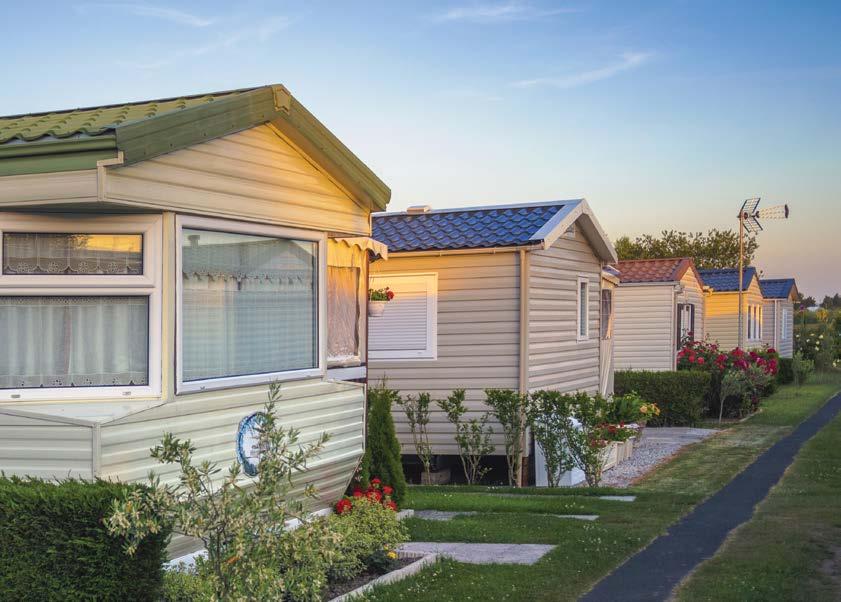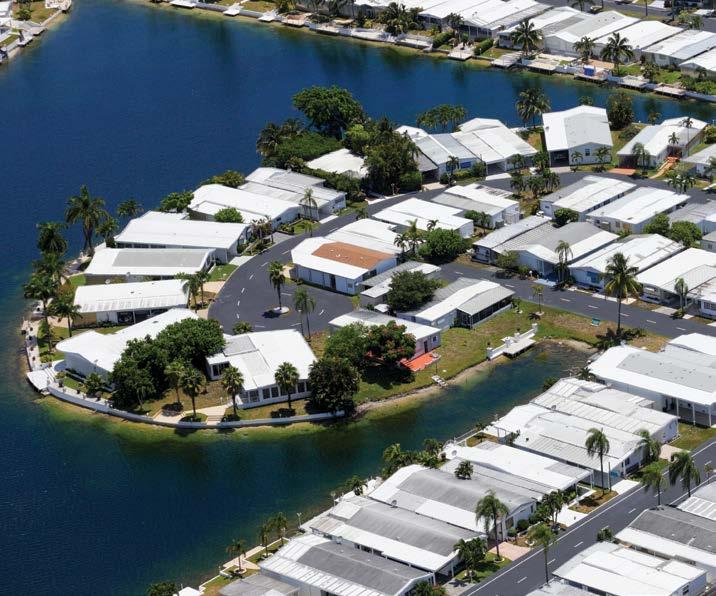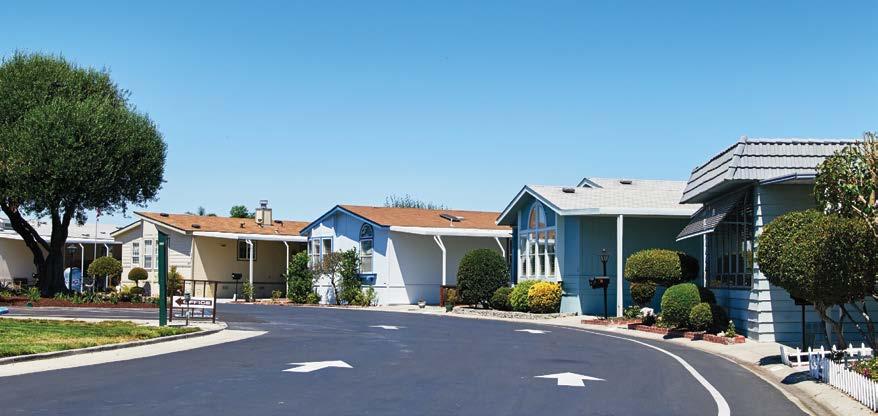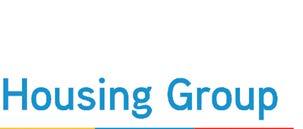
12 minute read
Low-Hanging Fruit – The Essentials of Operating a Manufactured Housing Community
The Essentials of Operating a Manufactured Housing Community low-hanging fruit
by Steven Blank
Manufactured housing communities are a unique form of multi-family housing, the differential being that we primarily are responsible for our community buildings, common areas, and infrastructure but not the homes, except as they relate to community aesthetics. To expand the differential between MH and other forms of multi-family, in many cases our resident’s home investment was larger than the community owners, on a persite basis. Resident-owned homes are
the reason that MH has been hailed for its ability to be run passively and why there have been so many independently owned communities. If a resident owns their home, it is their responsibility to maintain it. As such, all the community owner must do is maintain the land and common areas —a much easier feat when compared to other forms of multi-family housing. However, much of the passiveness of the MH industry changed due to the last recession and the fallout of chattel lending, as well as the increase
in customers who no longer want to own. Those chattel lenders were replaced by recourse (to community owners) lending that had not been seen since the early 1970s. These changes, among others, including attrition outpacing sales, has had the net effect of dramatically increased vacancy rates. This pivoted our passive model into one with varying degrees of reliance home rental, in some cases completely replacing the sales model.
The impact of this business model shift cannot be understated, as it changed the entire landscape of the industry. In the past, bringing in and selling a new home was simple and there was little liability on the community owner. With recourse loans and/or the addition of rental homes, the liability never leaves the community owner as they have a stake in the success and/or failure of their residents.
In simple terms, this business model shift has made the operation

of the MH community much more important and labor intensive. Here are some considerations and best practices that community owners and operators should consider adopting to ensure they are making the most out of their asset.
Understanding that the Land in MHCs are the Most Important Asset
Operating a community is like operating a small town and all the town’s utilities and infrastructure are your concern. If you already are or plan on renting homes, that brings another layer of commitment into the picture, as you no longer are just a landlord of a land-lease community but now have responsibilities that are similar to those at an apartment complex or other standard multi-family settings. Roadways are another key part of every community and one of the first things to be put off when times get tough and cash flow slows. Even if a community has all homeowners, those homeowners still pay for the »
maintenance and upkeep of the community. And upkeep of roadways are always a primary resident concern. As time goes on without maintenance, the more expensive roadway repairs become. Asphalt roads are the more popular option with communities as they are much cheaper than concrete
–Steven Blank
(especially when it comes to repairs), but they are not nearly as durable. If your community has asphalt roads, the best bet is to continuously invest in them, by crack sealing, seal coating and pothole filling. The key here is to ensure that the base of the roads maintain their integrity. Because once the base is damaged, all bets are off about their longevity.
Utility Sub-billing
The place that we constantly see the most money left on the table is with water and sewer billing and re-billing. Many communities have a master meter that bills for all the water and corresponding sewer charges associated with the property, providing the ability to bill back those amounts to residents. What we see most often is under billing. A well-run community should be rebilling at least 90% of the
master meter volume and 95% of the master meter charge amount. If your property is not meeting these goals, a good course of action would be to compare your re-billing rates and the potential for leaks. Remember, the rates you pay will go up periodically and those increased charges should be passed on to your residents. Make sure to always compare master meter usage to resident usage, often this is the only way to identify leaks in your system.
Have a Documented Operating System
Good operators have documented processes and procedures that explain how to perform each job a community/ field employee conducts on a day-today basis and ensures the community staff is supported through an active supervisor and up-to-date technology. One process that is followed by all is imperative when operating multiple properties.
Many operators make the mistake of becoming overly reliant on their community managers in that they expect the managers to be able to handle anything and everything from the ground floor up. As a result, managers (sometimes the only individuals whom residents see) are not provided with adequate training and support from corporate staff, many of whom lack refined industry knowledge. It can be a recipe for disaster. Remember, this business is not like running other forms of residential property. Employing corporate staff with MHC experience is a necessity.
Add Value to your Residents
Ultimately, we are here to provide affordable housing to our residents and the key piece of affordability is to proThe areas of operations that will yield the most to your bottom line are: • Billing and collections • Operating community office and staff • Communication with residents • Community curb appeal • Resident relations and rule enforcement • Compliance • Sales, leasing, and marketing
vide value. Residents today have more options than ever because of technology that allows them to rate, shop, or research community reputation with a smartphone and a Google search. You cannot operate an efficient and profitable portfolio at scale without a good value proposition and the best way to do this is by understanding the wants, needs, and expectations of your residents and then meet (or surpass) those expectations.
The best recipe to ensure that this is accomplished is by maintaining all common areas and infrastructure at your property, and having a team in place that can deliver the product and service that your operating system is meant to create. MHV Steven Blank is the president of Blank Family Communi ties, a third-party management group in the Midwest, with 10 years of MH owner/ operator experience and membership in the MMHA. He has a bachelor’s degree from Oakland University in industrial/ organizational psychology and is the creator of the Blank Operating Method.

WWW.MONROE-GIORDANO.COM TEL (813) 229-5055 • FAX (813) 229-5363 777 S. Harbour Island Blvd., Suite 140, Tampa, FL 33602
Preparing Positioning
Your Park & Pocket for Rent Control
by Kevan Enger

The rent control movement is gaining ground across the manufactured home community landscape. Once just focused on the multi-family sector, the affordable housing crisis and the recent rental increases by corporate mobile home community buyers has prompted a much-publicized outcry. This outcry has spurred grassroots resident movements that have grown to fuel political soapboxes and legislative bills in the fight for the vote and the dollar. Cities and states across the country have begun moving from just talking about rent control in manufactured housing communities to implementing it. In this article, we will take a closer look at how we got here and how you can prepare for and better position your community, your residents, and your pocket for the possibility of rent control.
How We Got Here
The affordable housing crisis has hit an all-time high. No state has an adequate supply of affordable rental housing for the lowest-income renters. It is estimated that nearly 38 million households nationwide, or 31.5% of all households, are cost-burdened by housing--meaning they pay more than 30% of their income on housing.
That 38 million is comprised of approximately 20.5 million renters and 17.3 million homeowners who continue to face unaffordable rents. That’s a near-record share of renters — 47.4% — and in the country’s hottest markers, even higher-income renters are being challenged by record rents and unaffordability.
Even more striking is that more than 18 million households are considered severely cost-burdened with more than half of their income going to housing. When we break it down, the numbers are revealing. • Approximately 9.5 million renters and 5.4 million homeowners earn less than $30,000 a year In the severely cost-burdened category, we have: • 1.1 million homeowners and 927,000 renters earning between $30,000 and $44,900 • 731,000 homeowners earning between $45,000 and $74,999 Why is this happening?
One of the reasons for this trend is that rising rents and home prices are growing faster than income. According to a Harvard study, rents grew another 3.6% in 2018, and after adjusting for inflation, home prices were near their highest levels since 1980. On top of that, since 2011, the stock of low-cost rentals has shrunk by a remarkable four million units, including a million in 2017 alone.
This affordable housing crisis is what fueled the gold rush to the manufactured home sector in the first place, bringing in corporate and independent buyers eager to get a piece of the affordable housing pie.
As the acquisitions and consolidation ripple across the sector, many of the new owners took advantage of the untapped upside (in the form of below-market rents) and were quick to raise rental rates to achieve market levels. The backlash from residents was swift, and it became a talking point for politicians, municipal officials, and governments agencies. All levels of the political spectrum became reinvigorated on the topic. There has been no turning back from the upheaval since, as the rent control conversation has gained momentum and is spreading across the country.
–Kevan Enger
The Implications
The pros and cons of rent control are being disputed everywhere. To do the topic justice and to fully explore the implications at the micro and macro levels, we need a separate and dedicated article. What we will explore on this occasion is the topline, short-term potential impact of the trend itself on the sector and how that could affect current owners.
Notoriety Could Lead to Less Investment: From Bernie Sanders to local council folk, affordable housing and rent control are hot topics. Whether you agree with it or not, this is one of those issues that has the potential to grow »
Turnkey Water Submetering Saves Money, Water, and Time
WHY CHOOSE METRON? • Bill residents directly, down to the drop • Detect leaks and notify residents quickly • Save on utilities and increase property value
Come see us at the MHI Congress & Expo at MGM Grand in Las Vegas, April 6-8, for a live demonstration of WaterScope.

BoothS #504 and #505 To learn more, visit our website: www.metronsubmetering.com
in notoriety, especially if there are more high-profile disputes over rent hikes. The implications of this are that notoriety adds fuel to the rent control fire, limiting upside for current owners and potential investors in both value and rents. As a result, some of the more sophisticated new owners are realizing that drawing attention to the topic as a result of dramatic increases in rents upon acquisition is not the way to go.
Flight Could Create Less Supply: Ironically, upside limits in the form of rent control could lead to flight by potential investors and developers, thereby possibly exacerbating the affordable housing crisis. Why? • Decreased interest from investors would result in waning demand as investors seek opportunities with higher returns. • Diminishing demand also would decrease the value of existing parks for current owners and decrease supply as interest in park development would dry out. • Less supply would lead back to higher prices for residents, thereby exacerbating the original problem rent control was supposed to solve.
So What Now?
The good news is that overall, it is still a seller’s market. There is still time to take the bull by the horns and take strategic action for better positioning if rent control does come your way. Get Involved: There is a saying that goes, “If you’re not at the table, you’re on the menu.” With that in mind, get involved in your local manufactured home association and your municipality’s economic development groups. Make sure you have a seat at the table and your voice is heard on the topic of
rent control as well as other issues affecting the manufactured home sector. Know Your Rent Comps: Now more than ever, knowing your rent comps is essential. This will allow you to see how much room your rates have to grow. You can then begin a gradual process of reasonable increases to leverage existing upside in your favor while protecting your residents from larger and more dramatic increases in the future.
In addition, closer-to-market rents will increase the value of your property, provide additional revenue to make improvements to your community, and allow you to achieve a better sales price when you’re ready to sell. Get a Broker Opinion of Value: This is the time to get a broker opinion of value (BOV) on your property from an experienced seller-focused broker. A BOV will tell you the potential value and sales price of your property. In addition, I also provide sellers information on market rents and make recommendations on how they can increase the value of their property, and thus, their return. This will help you get a complete picture of the opportunity at hand.
These strategic pre-emptive actions will help you better prepare and position your park, residents, and pocket for the possibility of rent control. MHV Kevan Enger is a partner and man ufact ured hou sing director for Capstone MH. He specializes in helping mobile and manufactured home park property owners position, market, and sell their properties to maximize returns. Call him at (407) 494-8541 to discuss current listings or to determine if now is the time to sell.
Market Knowledge & Execution.


TRANSACTION VALUATION DEBT & EQUITY
SERVICESSERVICES SERVICES
MICHAEL J. NISSLEY
BRUCE NELL, MAI AI-GRS, MRICS
Executive Managing Director National Practices Valuation Advisory Group +1 614 436 9800 bruce.nell@colliers.com
KARI PAREKH
Director | Capital Markets Manufactured Housing & RV Group +1 904 207 3696 kari.parekh@colliers.com
OUR EXTENSIVE ADVISORY SERVICES INCLUDE:
Mobile Home Communities & RV Resorts Valuation & Advisory Services Debt & Equity Finance Capital Markets & Investment Sales Acquisitions & Dispositions International - Canada, Europe, Australia Distressed Assets










